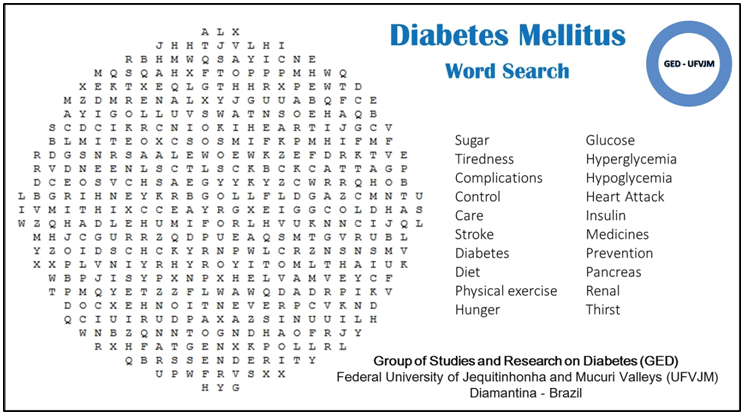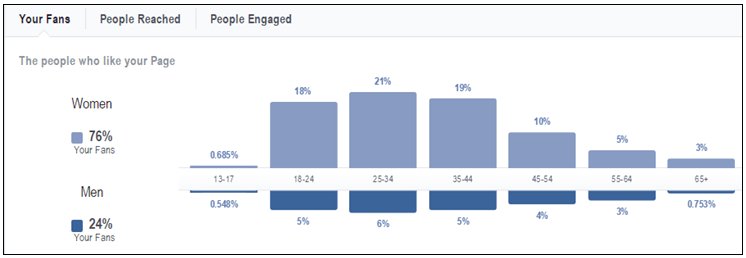
Figure 1: Illustrative image of a Diabetes Mellitus Word Search Game developed in English language for publication on Fanpage Diabetes Diamantina


Edson da Silva* Marileila Marques Toledo Paulo Henrique Lopes
Group of Studies and Research on Diabetes, Department of Basic Sciences, Federal University of Jequitinhonha and Mucuri Valleys, Brazil*Corresponding author: Prof. Edson da Silva, PhD, Group of Studies and Research on Diabetes, Department of Basic Sciences, Federal University of Jequitinhonha and Mucuri Valleys (UFVJM), Campus JK, Edifício DCB-DCBio, Sala 129, CEP: 39100-000, Diamantina, Minas Gerais, MG, Brazil, Tel/Fax: +55 38 3532 1200; E-mail: edsondasilvaatm@hotmail.com
Worldwide, the number of individuals with diabetes mellitus (DM) is growing, and the increasing focus is on its prevention. Nowadays, strategies are needed for providing DM patients with the knowledge, skills and different plans that they need and can use in prevention or management of DM [1]. There are number of innovative technologies available to help patients and facilitate their daily routines [2]. Given this, the expansion of technology has transformed society and especially diabetes education over the years.
Puzzles are defined as problem-solving activities that require learners to formulate solutions [3]. Games and puzzles are active learning tools that are useful for acquiring knowledge and cognitive skills. Research indicates that games and puzzles have been extensively used in language learning. Different forms have been used as new and useful learning tools in health education, such as puzzle games for hematology [4], puzzle games for gastrointestinal disease [5] and crossword puzzle games in obstetric nephrology [6], but little data exists about their use in diabetes education.
Hypertext Preprocessor (PHP) word search puzzle creator is a popular general-purpose scripting language that is especially suited to web development [7]. FS.WordFinder is a kind of PHP word search puzzle that will create a puzzle automatically when you input your own words and set the many options to your liking. You can use different pre-created styles for your puzzle or create your own using the style toolkit. The puzzle is printable, and you can also complete it through your browser. Multiple languages are supported [8].
We have been creating various word search games for health education. Recently, we created one word search game puzzle using the FS.WordFinder with the aim of exploring this new possibility for use in online diabetes education. We used the word search generator software on the FS.WordFinder website. One of our games was developed with 16 general words about diabetes in the Portuguese language. Then, the words chosen in Portuguese were translated into English and Spanish (Figure 1). Three versions of the word search game were developed. All the versions of this game were published in Fanpage Diabetes Diamantina, which has about 970 followers in Brazil and 44 other countries around the world (Figure 2) [9].

Figure 1: Illustrative image of a Diabetes Mellitus Word Search Game developed in English language for publication on Fanpage Diabetes Diamantina

Figure 2: Fanpage Diabetes Diamantina. Graph showing the profile offans who enjoyed and followed the Diabetes Fanpage. In columns: percentage offans by gender (male and female) and age (13-17, 18-24, 25-34, 35-44, 45-54, 55-64, from 65 years old). Data was obtained from the Facebook database in november 2016
These games gained significant acceptance, with a total reach of 7,136 people. As the questions were set up in a fairly even distribution from easy to difficult, people at all levels of knowledge about diabetes were able to participate. The game that was created in English reached 3,708 people, with 155 clicks in publishing and 217 reactions (80 likes, 20 comments, 115 shares and 3 reactions). The game in Spanish reached 2,441 people, with 143 clicks in publishing and 223 reactions (84 likes, 25 comments, 111 shares and 3 reactions). The game in Portuguese reached 987 people, with 148 clicks in publishing and 132 reactions (53 likes, 14 comments, 63 shares and 2 reactions). Posts with three versions of the games remain public for sharing or use of games by users of the Facebook social network [9].
Until the final period of this study, Diabetes Diamantina reached the total number of 970 fans who could follow and receive the posts of this social network [9]. Among the page’s fans, 76% are women and 24% are men (Figure 2). Fans are in Brazil and in 44 other countries, including Argentina, Chile, Portugal, United States, Mexico, Spain, Italy and Germany. In figure 1, see the profile of fans that enjoyed and followed the Diabetes Fanpage. Fans of Diabetes Diamantina are predominantly young people from 18 to 44 years of age, and the majority are female. In addition, the high number offans and the high reach of the posts opened a range of future opportunities with this strategy of health education. However, the Facebook database does not provide more detailed information about the gender, age, country, and city of users who enjoy posts in a Fanpage. Thus, studies on the learning outcome, learning styles of people who prefer this, use of puzzles games at different levels of diabetes education and methods to create clues that stimulate critical thinking are needed.
The puzzles games use in education has advantages thus as building critical reflection, communication, cooperative learning skills and atitudes [10,11]. With addition of this kind of tool in health education it’s possible to introduce new strategies to make learning more active and interesting [12]. Traditional methods used in diabetes education, such as lectures, seminars, textbooks, problem-solving, and workshops using content that involves health promotion and prevention of DM, do not always motivate patients or health professions. In this way, the current model of diabetes education may be useful to complement the diabetes education process.
It can thus be seen that games deserve the attention of professionals, educators and patients. Studies are needed to assess the impact of this kind of game in diabetes education; however, the development of new strategies to improve the current method of diabetes education is extremely important. In addition, sharing information safely on the Internet and exploiting Information Technology and the current innovations of the digital age can strengthen the integration of the university with the community and contribute to the training of health professionals involved in the current virtual society.
None.
None.
Download Provisional PDF Here
Article Type: Original Commentary
Citation: da Silva E, Toledo MM, Lopes PH (2017) Word Searches Puzzles as a Tool to Motivate Learning about Diabetes Mellitus. J Dia Res Ther 3(1): doi http://dx.doi.org/10.16966/2380-5544.125
Copyright: © 2017 da Silva E, et al. This is an open access article distributed under the terms of the Creative Commons Attribution License, which permits unrestricted use, distribution, and reproduction in any medium, provided the original author and source are credited.
Publication history:
All Sci Forschen Journals are Open Access